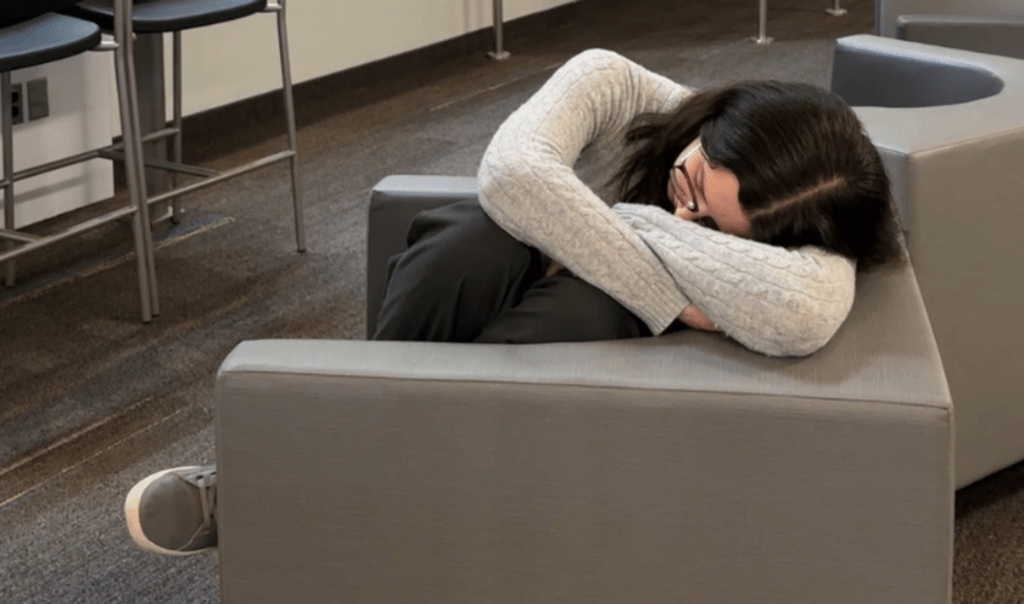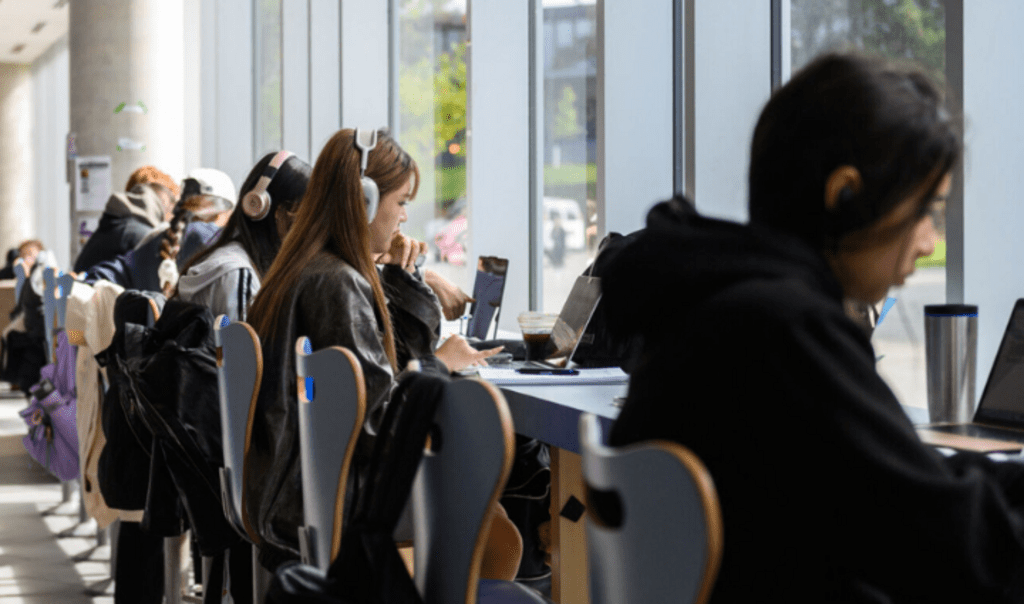
Book an appointment with Campus Wellness
At 519-888-4096, press 1 for Health Services and 2 for Counselling Services
Visit us during office hours in Health Services or Needles Hall, 2nd floor
Email: For those who are unable to call due to accessibility concerns, please email counselling@uwaterloo.ca indicating that you are unable to book by phone. Please note that this email address is not monitored 24/7 and cannot support urgent or emergency requests.

Mental health support
If you feel overwhelmed or anxious and need to talk to somebody, explore the range of counselling options available to help you live a healthy and balanced life. Our intake specialists will help determine the most effective approach based on your needs:
- Brief counselling
- Single session counselling
- Crisis appointments
If you have specific needs, or would like to request a counsellor with lived experience or identity, specialized counsellors are available for those who identify as Black and 2SLGBTQIA+.
Book an appointment with Campus Wellness, Counselling Services.

Be You at Waterloo
Connect in small groups with mental health professionals to dive deeper into what it means to Be You at Waterloo. Join safe spaces set-up to help you embrace your individuality and celebrate the qualities that make you who you are.
Additional mental health resources for UWaterloo students
Get active, stay well
Staying active is a powerful way to boost your mood and manage stress. Join a fitness class, intramural sport or drop-in for open recreation—there are plenty of ways to move your body and support your mental well-being. Not sure where to start? Try Move your Mind and get peer to peer support to start moving today!
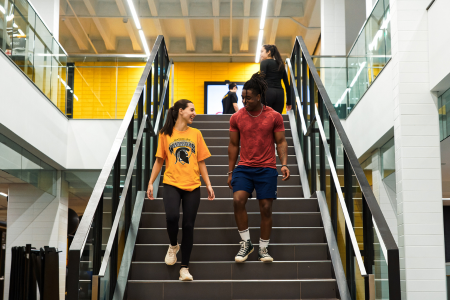
Doro: Your Daily Mental Health Coach
In partnership with Campus Wellness, you can access Doro, an AI-powered app developed by UWaterloo students, to support your mental well-being. Guided self-reflection, therapeutic journaling, and skill-building tools designed for everyday support. All UWaterloo students receive 150 minutes of free access.
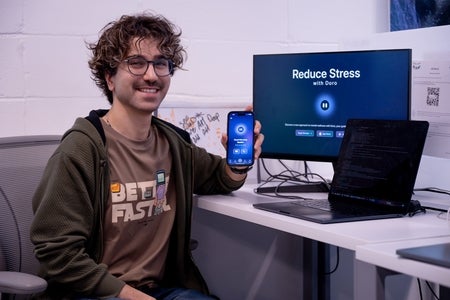
WUSA Mates
Mates is a student-run service focused on supporting student well-being. Our service offers one-on-one peer support appointments for undergraduate students looking to talk to someone in a confidential space. Our in-person office also has a wellness lounge, where students can drop-by and participate in wellness activities.
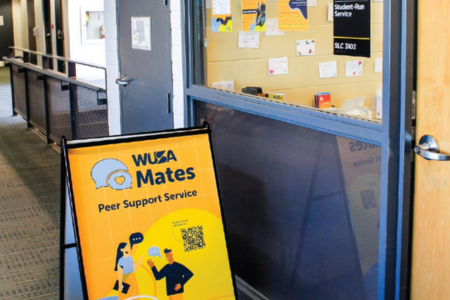

Physical health and primary care
If you’re experiencing physical symptoms or need support maintaining your overall health, book an appointment with Health Services. Our primary care team will work with you to understand your needs and connect you with the right care to help you feel your best.
- Illnesses, injuries and vaccinations
- Management of ongoing physical or mental health concerns
- Sexual health and wellness
- Medical documentation and forms (Verification of Condition)
- Naturopathic and Nutritional services

Get active, feel good
Increase endorphin levels, boost your heart health, improve your sleep and sharpen your focus—a few ways that physical activity supports your overall health. Hit the gym, check out the rock climbing wall, go skating or make a splash in the pool.
Accessibility, equity and safety resources:
Disability Accommodations
Receiving mental health support? Recovering from an injury or surgery?
If you know or suspect you have a disability or disabling condition that requires academic accommodation, support is available.
AccessAbility Services can help you develop your individualized academic accommodation plan for all components of your academic career. To schedule an appointment or contact the Front Desk, please visit us in-person during our business hours (Monday - Friday between 8:30 am - 4:30 pm) or phone 519-888-4567 ext. 35082. Our office is located in Needles Hall North, 1st Floor, Room 1401. For all other inquiries, please email access@uwaterloo.ca.
Equity and anti-racism support
UWaterloo is here to listen, advocate and support
If you have experienced harm, or are looking for support related to your identities, the Office of Equity, Diversity, Inclusion and Anti-racism is here to help.
You can also report instances of hate or reprisal to the Office of Equity, Diversity, Inclusion and Anti-racism.
Sexual violence prevention and response
We're here to listen.
If you've been impacted by sexual violence, support is available. Advocates will connect you to services and resources, and empower you to understand your options to take the next steps.
If you have an urgent non-crisis need, we will do our best to meet with you as soon as possible. Please connect with us at svpro@uwaterloo.ca.
How-to guides:
These articles cover timely, practical topics that reflect the real challenges and questions students face, offering tips, insights, and strategies you can explore at your own pace. Whether you’re looking for support, perspective, or everyday tools to help you navigate student life, these resources are here whenever you need them.
Get a better sleep. Tips to improve sleep habits to support your academic succes.
Incorporating movement into your daily routine is a simple, free, and effective tool to support mental well-being. There are many places on campus to find enjoyable ways to stay active!
Tips for students to manage stress during exam season!
Undergraduate
To help UWaterloo undergrad students pay for the health services they need, WUSA has partnered with Studentcare to provide extended health and dental coverage. The Plan is designed specifically for students to cover many services not covered by OHIP and other basic health-care programs.
Graduate
From access to a range of health professionals to coverage of prescription drugs, vaccinations, diagnostic services and medical equipment, the GSA student supplementary Health Plan is designed to provide graduate students important health services, in addition to the basic provincial healthcare plan.
Ontario Health Insurance Plan (OHIP)
Every Ontario resident (Canadian Citizens and Permanent Residents) with a primary home in Ontario is entitled to access emergency and preventative care under OHIP.
If you have applied for Permanent Resident status in Canada and have received your "approval in principle" letter from Immigration, Refugees, and Citizenship Canada (IRCC) you may be eligible for OHIP coverage.
University Health Insurance Plan (UHIP)
International undergraduate students are automatically charged for coverage under the University Health Insurance Plan (UHIP) once they enroll in more than two 0.5-credit on-campus courses.
Continuous coverage must be maintained throughout your academic career at the University unless/until you can provide proof of having obtained OHIP coverage or an equivalent health plan.
Medical insurance coverage on co-op outside of Canada
If you plan to work abroad, having appropriate health insurance is crucial. Familiarize yourself with your insurance plan details and see if supplementary insurance is required.
Out of province considerations
Due to professional regulation restrictions, we do not provide ongoing counselling support to individuals currently residing outside of Ontario. If you are out of the province, please seek care where you are or contact Empower Me.
Uninsured services
Some of the services provided are uninsured services and are not covered by UHIP, OHIP, or other provincial plans.
Principles and Privacy Policy
Reporting
We are actively capturing and documenting qualitative and quantitative measures related to the success of our programs and services. Read our latest report to the Board of Governors below.
To request a written copy of Waterloo’s Student Mental and Well-being Principles, please email the Secretariat.
The contents of this website will be reviewed, and amended as appropriate, at least every five years, as required by the Ministry of Training, Colleges and Universities Act.
